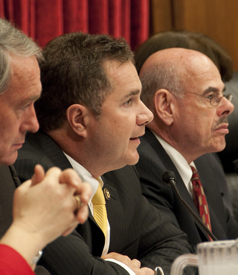BP’s headache continues to get worse. In a July 29 letter to BP America’s President Lamar McKay, Reps. Henry A. Waxman (D-California) and Edward J. Markey (D-Massachusetts) have demanded BP’s executive appear before the House Committee on Energy and Commerce by August 6. Unlike then-CEO Tony Hayward’s testimony which focused on the April 20 explosion, this time Waxman and Markey are looking into a less-visible component of the BP disaster: reports that BP attempted to hire experts and bar them from discussing their findings with anyone outside of the company for three years or until BP established its Gulf restoration plan. In the case of the University of South Alabama, the BBC reports, the multi-billion dollar company sought to hire not just one expert, but the entire marine sciences division.
“The disaster in the Gulf of Mexico is not a private matter,” Waxman and Markey wrote,” adding “any effort to muzzle scientists or shield their findings under doctrines of legal privileges could seriously impede the recovery.”
Waxman and Markey cite reports from the Mobile Register, BBC and The Associated Press as among the reports that tipped them off to the oil company’s efforts. However, scientists aren’t the only ones being consulted, and Waxman and Markey have told BP’s McKay they want a full accounting of “third-party consultants, academics and scientists” retained “in connection with assessing the environment and health impacts” of the oil spill and Gulf restoration since April 20.
According to BP’s second quarter report, the company is the subject of 300 civil lawsuits, as well as investigations by the Department of Justice, US Presidential Commission, the Securities and Exchange Commission, the US Chemical Safety Hazard Investigation Board, Congress and a joint investigation by the US Coast Guard and the Bureau of Ocean Energy, Management, Regulation and Enforcement over the Deepwater Horizon Incident. A report by The New York Times says BP has set aside $32.2 billion, for the cleanup, but acknowledges that lawsuits could up the amount owed.
The well, which was capped July 15 and poured between 35,000 to 60,000 of barrels of oil a day into the Gulf for 87 days, may finally be sealed. According to Bloomberg.com, the company may attempt the “static kill” this week.
BP could not be reached for comment.
We’re not backing down in the face of Trump’s threats.
As Donald Trump is inaugurated a second time, independent media organizations are faced with urgent mandates: Tell the truth more loudly than ever before. Do that work even as our standard modes of distribution (such as social media platforms) are being manipulated and curtailed by forces of fascist repression and ruthless capitalism. Do that work even as journalism and journalists face targeted attacks, including from the government itself. And do that work in community, never forgetting that we’re not shouting into a faceless void – we’re reaching out to real people amid a life-threatening political climate.
Our task is formidable, and it requires us to ground ourselves in our principles, remind ourselves of our utility, dig in and commit.
As a dizzying number of corporate news organizations – either through need or greed – rush to implement new ways to further monetize their content, and others acquiesce to Trump’s wishes, now is a time for movement media-makers to double down on community-first models.
At Truthout, we are reaffirming our commitments on this front: We won’t run ads or have a paywall because we believe that everyone should have access to information, and that access should exist without barriers and free of distractions from craven corporate interests. We recognize the implications for democracy when information-seekers click a link only to find the article trapped behind a paywall or buried on a page with dozens of invasive ads. The laws of capitalism dictate an unending increase in monetization, and much of the media simply follows those laws. Truthout and many of our peers are dedicating ourselves to following other paths – a commitment which feels vital in a moment when corporations are evermore overtly embedded in government.
Over 80 percent of Truthout‘s funding comes from small individual donations from our community of readers, and the remaining 20 percent comes from a handful of social justice-oriented foundations. Over a third of our total budget is supported by recurring monthly donors, many of whom give because they want to help us keep Truthout barrier-free for everyone.
You can help by giving today. Whether you can make a small monthly donation or a larger gift, Truthout only works with your support.
